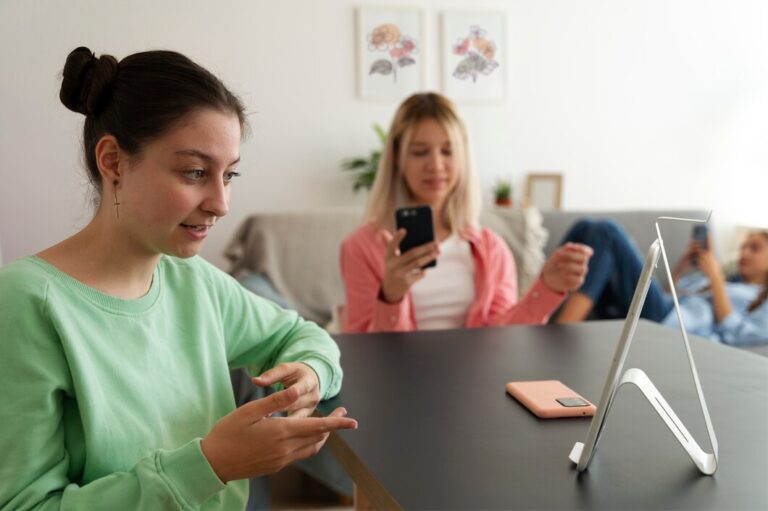
What’s the first thing you reach for in the morning? If it’s your smartphone, you’re not alone. From the moment we wake until our heads hit the pillow (and often, even after), we are immersed in a relentless stream of digital information. Notifications ping, emails demand attention, social media feeds scroll endlessly, and the lines between our work, social, and personal lives blur into one digitally mediated existence.
We’re more connected than ever, yet paradoxically, many of us feel increasingly disconnected – from ourselves, from each other, and from the physical world around us. This constant barrage isn’t just tiring; it’s taking a toll on our mental clarity, emotional wellbeing, and ability to truly engage with life.
Feeling overwhelmed, anxious, or simply drained by the digital deluge? You might be overdue for The Digital Detox. This isn’t about permanently abandoning technology, but about consciously stepping back to reset, recharge, and re-evaluate our relationship with our devices.
This post delves into why unplugging matters so profoundly in today’s hyper-connected world. We’ll explore the science-backed benefits for your mind and mood, the ways it can deepen your real-world connections, and practical steps you can take to implement your own restorative digital detox, reclaiming your time, attention, and ultimately, your peace of mind.
The Always-On Dilemma: Drowning in Digital Noise

We live in an “always-on” culture, where the expectation of constant availability and responsiveness is the norm. Our devices, designed with sophisticated techniques to capture and hold our attention, deliver an endless stream of stimuli – news alerts, work emails at all hours, social media updates, targeted ads, infinite entertainment options.
While technology offers incredible tools and conveniences, this non-stop influx creates a state of chronic digital overload. Our brains, not designed for this level of constant, fragmented input, struggle to keep up. The result? Increased stress, fractured attention spans, and a pervasive feeling of being mentally cluttered.
Think about the sheer volume of information you consume daily. How much of it is truly necessary or enriching? The constant switching between tasks – checking email while watching TV, scrolling social media during conversations – trains our brains for distraction, making deep focus increasingly difficult. This “cognitive fragmentation” impacts our productivity, creativity, and even our memory.
Furthermore, the curated perfection often displayed on social media can fuel comparison and anxiety, leading to feelings of inadequacy or FOMO (Fear Of Missing Out). We’re exposed to more opinions, more crises, and more demands on our attention than any previous generation. Is it any wonder so many feel burnt out? The digital noise isn’t just background static; it’s actively shaping our mental landscape. How often do you end your day feeling energized versus mentally drained by your screen time?
This constant connectivity also blurs the essential boundaries between different parts of our lives. Work notifications interrupt family dinners, social media pressures intrude on quiet moments, and the pressure to be perpetually available erodes precious downtime needed for rest and reflection. Recognizing the extent of this digital saturation is the first step towards understanding why intentionally unplugging isn’t a luxury, but a necessity for navigating the modern world healthily.
Reclaiming Your Mind: The Cognitive Benefits of Unplugging

Stepping away from screens, even for short periods, offers profound benefits for our cognitive functions. The Digital Detox acts like a reset button for an overstimulated brain, allowing it to rest, recover, and ultimately, perform better. One of the most significant gains is the restoration of focus and attention.
In our default state of digital immersion, our brains become wired for distraction, constantly seeking the next novel stimulus. Unplugging allows us to break this cycle and retrain our attention muscles. Engaging in single-task activities, like reading a physical book, having an uninterrupted conversation, or working on a hobby, strengthens our ability to concentrate deeply for extended periods.
This enhanced focus translates directly into improved creativity and problem-solving. When our minds aren’t constantly reacting to external pings, they have space to wander, make novel connections, and engage in deeper, more reflective thinking.
Boredom, often seen as something to be avoided at all costs (usually by reaching for a phone), is actually crucial for creativity. It’s in these moments of quiet contemplation that insights often emerge. Think of your brain like a muscle: constantly bombarding it with shallow digital tasks weakens its ability for heavy lifting (deep thought), while periods of rest and focused activity build strength.
Moreover, reducing digital input can lead to better memory consolidation and reduced mental fatigue. Sleep quality often improves without late-night blue light exposure from screens, which is critical for cognitive function.
By giving your brain a break from the constant decision-making involved in navigating the digital world (Which notification to check? What link to click? How to respond?), you conserve mental energy, leading to greater clarity and reduced feelings of overwhelm. “In the age of acceleration, stillness is a superpower.” Unplugging provides the stillness needed for your mind to thrive.
Key Points:
- Restored Focus: Unplugging helps retrain attention spans weakened by constant digital distraction.
- Enhanced Creativity: Allows mental space for mind-wandering, reflection, and novel idea generation.
- Improved Problem-Solving: Facilitates deeper thinking patterns instead of fragmented reactions.
- Reduced Mental Fatigue: Conserves cognitive resources by minimizing constant digital decision-making and input.
- Better Memory & Sleep: Less blue light and mental clutter contribute to improved sleep and memory function.
The Digital Detox: Why Unplugging Matters for Mental & Emotional Wellbeing

Beyond cognitive boosts, The Digital Detox is fundamentally an act of self-care with significant implications for our mental and emotional health. The constant connectivity, comparison culture, and information overload inherent in our digital lives are increasingly linked to rising rates of anxiety, depression, and overall stress. Intentionally unplugging provides a powerful antidote, creating space for emotional regulation, self-reflection, and genuine restoration.
One of the most immediate benefits reported by those who detox is a reduction in anxiety and stress. Stepping away from the relentless news cycle, the curated perfection of social media, and the pressure of constant availability allows our nervous systems to calm down.
We escape the comparison trap that fuels feelings of inadequacy and the FOMO that makes us feel like we’re always missing out on something better. Taking a break allows us to reconnect with our own lives, appreciate what we have, and detach from externally imposed pressures and anxieties. Have you ever noticed how much calmer you feel after a day spent largely offline, perhaps in nature?
Furthermore, unplugging fosters increased self-awareness and emotional clarity. Without the constant external noise demanding our attention, we have the opportunity to tune into our internal landscape – our thoughts, feelings, and bodily sensations. This introspection is vital for understanding our needs, processing emotions healthily, and making conscious choices aligned with our values, rather than reacting impulsively to digital triggers.
Studies also suggest links between excessive social media use and negative body image or symptoms of depression; reducing exposure can therefore contribute to a more positive self-perception and improved mood. By consciously choosing what we consume and when, we regain a sense of agency over our emotional state. It’s about trading digital validation for authentic self-connection.
Strengthening Real Connections: Beyond the Screen

While digital platforms promise connection, they often deliver a thinner, less satisfying version compared to genuine, face-to-face interaction. The Digital Detox encourages us to reinvest our time and energy into the real-world relationships that truly nourish us. When we put down our devices, we become more present, attentive, and engaged with the people right in front of us.
Think about conversations interrupted by phone checks, or family meals where everyone is silently scrolling. These small moments of digital distraction erode the quality of our interactions. Unplugging allows for deeper, more meaningful conversations.
We practice active listening, pick up on non-verbal cues, and build empathy in ways that text-based communication simply cannot replicate. Sharing experiences without the immediate pressure to capture and post them online allows us to be fully in the moment with our loved ones, creating stronger bonds and more vivid shared memories.
I recall a family gathering where we implemented a ‘phone basket’ rule; the initial awkwardness quickly gave way to hours of uninterrupted conversation, storytelling, and laughter – a level of connection we hadn’t experienced in years.
Moreover, stepping back from constant digital communication can actually strengthen relationships by fostering anticipation and intention. Instead of fragmented updates throughout the day, we might have more focused, intentional calls or visits. It also encourages us to rely on and develop our innate social skills, which can sometimes atrophy with excessive screen use.
By prioritizing presence over pings, we communicate to others that they have our full attention and that we value our time together. Authentic human connection thrives in the absence of digital barriers. Are your devices building bridges or walls in your most important relationships?
Practical Steps Towards Your First Digital Detox

Embarking on a digital detox doesn’t have to mean disappearing into a cabin in the woods for a month (though that sounds lovely!). It’s about intentionally creating periods of disconnection within your regular life. Here are practical steps to get started:
- Start Small & Define Scope: Don’t overwhelm yourself. Begin with achievable goals, like tech-free evenings (e.g., no screens after 8 PM), a screen-free hour during lunch, or a single screen-free day on the weekend. Decide which technologies you’ll avoid (e.g., smartphone, social media, laptop, TV).
- Communicate Your Intentions: Let close family, friends, or colleagues know you’ll be less available during your detox period. This manages expectations and can provide accountability.
- Plan Analog Activities: The key to avoiding the magnetic pull of your devices is having engaging alternatives ready. Make a list before your detox starts. (See Analog Activity Ideas below).
- Create Tech-Free Zones/Times: Designate specific areas in your home (like the bedroom or dining table) or times (like the first hour after waking or during meals) as permanently screen-free.
- Manage Your Environment: Physically remove temptation. Put your phone in another room, turn off your computer, hide the TV remote. Turn off all notifications on devices you aren’t fully detoxing from (if applicable).
- Track First (Optional): Consider using a screen time tracking app before your detox to understand your current usage patterns. Awareness is a powerful motivator.
- Be Mindful of Urges: When the impulse to check your phone arises, simply notice it without judgment. Take a breath. Remind yourself of your intention. Redirect your attention to your planned analog activity or your immediate surroundings.
Analog Activity Ideas for Your Detox:
- Read a physical book, newspaper, or magazine.
- Go for a walk, hike, or bike ride in nature.
- Play board games, card games, or do a jigsaw puzzle.
- Cook or bake something new (using a physical cookbook!).
- Engage in a hobby: gardening, painting, knitting, playing a musical instrument.
- Meditate, practice yoga, or do some gentle stretching.
- Have a long, uninterrupted conversation with someone face-to-face or via a landline call.
- Visit a library, museum, art gallery, or local park.
- Write in a journal, write a letter or postcard to someone.
- Simply sit quietly, observe your surroundings, and let your mind wander.
Common Concerns & Solutions

Deciding to unplug in our interconnected world can bring up valid concerns. Here’s how to address some common ones related to detoxing in daily life:
- Concern: “My work requires me to be constantly available.”
- Solution: Examine this assumption. Is it truly 24/7, or are there boundaries you could set? Communicate clearly with your team/manager about specific times you plan to be offline (e.g., evenings, weekends). Schedule offline time as you would an important meeting. Set up auto-responders. Most ‘urgent’ matters can often wait a few hours. True emergencies usually involve a phone call, not just an email or message.
- Concern: “I’ll miss out on important news or social events (FOMO).”
- Solution: Reframe FOMO as JOMO – the Joy Of Missing Out on digital noise and reclaiming your time. Trust that truly critical news will reach you. Schedule brief check-ins after your planned detox period if needed, but resist the urge during. Focus on the richness you are gaining in your immediate experience. Perhaps plan your detox with friends who share similar goals.
- Concern: “What if someone needs me in an emergency?”
- Solution: Keep one basic channel open for true emergencies if necessary (e.g., allow calls from specific contacts on a basic phone, or rely on a landline). Inform your closest contacts how to reach you in a genuine emergency during your detox. For most short detox periods, this risk is minimal.
- Concern: “I’ll be bored or won’t know what to do with myself.”
- Solution: This is often the point! Boredom is a gateway to creativity and reflection. Plan analog activities in advance (see list above). Acknowledge the habitual urge to fill empty moments with scrolling, but resist it. Embrace the quiet; see what emerges.
- Concern: “It feels isolating to be disconnected when everyone else is online.”
- Solution: Focus on the quality of connection you are fostering – with yourself and those you interact with face-to-face. Perhaps use the detox as an opportunity to schedule intentional, device-free time with others. Remember, this is a temporary break for your wellbeing, not a permanent withdrawal.
Before You Detox: Your Preparation Checklist

A little prep work can make your digital detox smoother and more rewarding. Use this checklist before starting your planned period of unplugging (e.g., a tech-free weekend):
- Define Duration & Rules: Clearly decide when your detox starts and ends, and which specific devices/apps are off-limits. Write it down.
- Inform Key People: Let family, close friends, or anyone who might genuinely need to reach you urgently know your plan and provide an alternative emergency contact method if needed (e.g., “Call [Partner’s Name/Landline] if it’s a true emergency”).
- Schedule Analog Activities: Plan specific, enjoyable things to do during your detox time to avoid defaulting to screens out of habit or boredom.
- Prepare Your Environment: Charge devices you’ll be turning off (so they’re ready after the detox), then turn them off and put them out of sight (e.g., in a drawer, closet). Gather your books, games, hobby materials, etc.
- Set Your Intention: Remind yourself why you’re doing this. What do you hope to gain? (e.g., peace, focus, connection). Write it down if helpful.
- Anticipate Challenges: Acknowledge that urges or feelings of restlessness might arise. Decide how you’ll handle them (e.g., take deep breaths, go for a walk, refer back to your intention).
- Pre-Download (If Necessary): If using offline resources (like a downloaded recipe or directions for a planned activity), ensure they are accessible without needing to go online during the detox.
- Commit to Presence: Make a conscious decision to engage fully with whatever you are doing during your detox, without worrying about documenting or sharing it online.
The Power of the Pause in a Non-Stop World

In a world saturated with digital noise and relentless demands on our attention, The Digital Detox is no longer a fringe concept but an essential practice for wellbeing. It’s a conscious act of reclaiming our time, focus, mental clarity, and emotional balance from the clutches of constant connectivity. Unplugging allows us to step back, breathe, and reconnect—with ourselves, with the people around us, and with the simple richness of the present moment.
The benefits ripple outward, enhancing our cognitive abilities, soothing our nervous systems, deepening our relationships, and ultimately, allowing us to live more intentional and fulfilling lives.
It’s not about demonizing technology, but about cultivating a healthier, more mindful relationship with it – one where we are in control, not our devices. Taking periodic breaks from the digital stream is a powerful form of self-care, an investment in your mental and emotional health that pays lasting dividends.
Your invitation: Don’t wait until you feel completely burnt out. Schedule your first (or next) digital detox and first wellness retreat, even if it’s just for a few hours or a single day. Experience the power of the pause. Notice the quiet, embrace the calm, and rediscover what truly matters when the screens go dark. The world beyond the feed is waiting.




